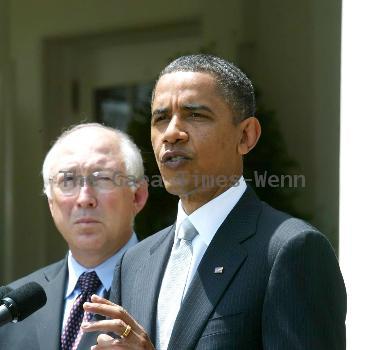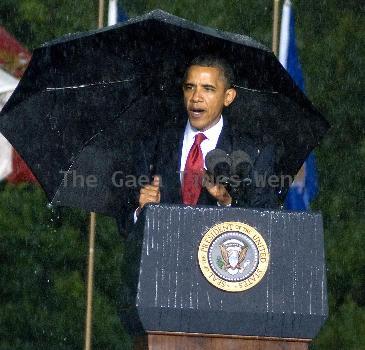With intel pick, Obama can boost clout for a beleaguered job. But does he want to?
By Matt Apuzzo, APThursday, June 3, 2010
Obama can boost intel boss’s job. Does he want to?
WASHINGTON — CIA Director Porter Goss held what amounted to a wake for his own job in 2005, when a newly appointed national intelligence director took the helm of the country’s far-flung intelligence network. Eight former CIA directors gathered at the agency’s headquarters to commemorate the times when they were still in charge.
The funeral, it turns out, was premature.
Five years later, the CIA director is still effectively the nation’s premier intelligence job. And even as President Barack Obama is close to naming the fourth director of national intelligence, that post has yet to live up to its powerful job description.
The centralized authority that was supposed to help fix the problems that led to 9/11 has been divided among powerful figures at the CIA and White House, including CIA Director Leon Panetta and homeland security adviser John Brennan.
And the Office of the Director of National Intelligence has largely become just another agency in the convoluted intelligence business. Obama’s choice of director will signal his vision for the job.
The jockeying for power within the intelligence community is more than run-of-the-mill Washington politics. It’s about two important questions that have gone unanswered for nearly a decade:
Who’s in charge of the nation’s spies, satellites, analysts, wiretaps and translators?
And who’s to blame when they fail?
Leading up to the 2001 terrorist attacks, intelligence agencies weren’t working together. Warning signs went unshared. Strands of analysis were scattered across the government. Agencies fought turf wars at home and abroad.
The DNI was supposed to change all that. Congress envisioned a commanding figure in charge of the intelligence machine, someone who would make sure a tip passed to a spy overseas could find its way to a CIA analyst in Washington, an FBI agent in New York and a military officer in Iraq.
In practice, it didn’t work.
Retired Adm. Dennis Blair, who resigned last month as DNI, was the nation’s top intelligence official on paper, but when he tried to assert control over the senior U.S. spies around the world, he was overruled by Panetta at the CIA, who had the support of the White House.
The National Counterterrorism Center, an operation under Blair’s command, came in for criticism by the Senate after the failed Christmas Day airline bombing. The center told Congress that no one intelligence entity “has sole responsibility nor bears the entire burden of either connecting dots or accountability for failing to do so.”
Lawmakers noted that’s exactly the responsibility and accountability they wanted the counterterrorism center to have.
Obama, meanwhile, has made his homeland security adviser Brennan his go-to person on terrorism issues. A career CIA officer with a lengthy counterterrorism resume, Brennan has had the president’s ear since the campaign. In intelligence circles, he’s is often referred to as the “de facto DNI.”
Brennan is also the public face of the administration’s national security efforts. He has been on the Sunday talk shows eight times, making the rounds after the failed Times Square bombing last month and Christmas plot. Blair did not make such appearances.
Lawmakers who created the DNI position hope Obama picks as Blair’s replacement a dominant personality who can assert his power over the CIA and command the authority that Brennan wields.
Obama’s early favorite for the job, Pentagon intelligence chief James Clapper, received a cool response from Capitol Hill in part because he was viewed as unlikely to assert that authority. But it’s unclear whether anyone can — or if Obama even wants someone who might disrupt the power balance on his security team.
“I don’t think Clapper’s the right person for the job,” said Sen. Kit Bond, the top Republican on the intelligence committee. “I recommended Leon Panetta because he’s the only one who would have the confidence of the president and might be able to assert some authority.”
But Bond acknowledged that Panetta is happy with his job leading the CIA.
There’s a difference of opinion within the intelligence community about whether its structure is inherently flawed or whether a dominant personality can make it work.
Kenneth Wainstein, who served as homeland security adviser to President George W. Bush, said it’s not necessarily about personalities. In an emergency, Wainstein said, the president is likely to look to his CIA and FBI directors because they have operational control.
“The agency heads end up being on point during crises, and those are the moments when you establish yourself with the White House,” Wainstein said.
The DNI briefs the president each day on the most serious threats, but the directors still control the spies on the ground and can scramble a team of FBI agents. Bush’s second DNI, Mike McConnell, cited that lack of operational control in 2008 when he told Congress that his office was essentially an intelligence “community leader.”
That’s not what Congress intended when it overhauled the intelligence structure after 9/11.
“These were difficult times and we moved quickly,” said Philip Mudd, a former senior CIA terrorism analyst and FBI national security specialist. “I think many people would look back and say, ‘If we had extended the debate, would we have gone a different direction?’”
Associated Press writer Adam Goldman contributed to this report.
Tags: Barack Obama, District Of Columbia, Intelligence Agencies, National Security, North America, Terrorism, United States, Washington

